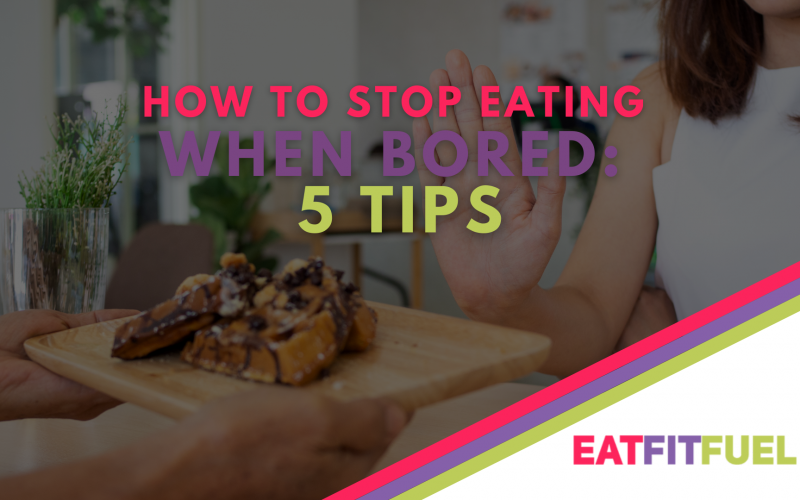We’ve all been there, haven’t we? Those moments when boredom strikes and the first thing we think of is reaching for a snack. That doesn’t necessarily mean that you’re hungry. It’s because boredom eating somehow provides fulfillment or a fix. So, if you’ve found yourself Googling ‘How to Stop Eating When Bored,’ you already know the challenge that is boredom eating, a very difficult habit to overcome.
But the good news is, you’re not alone in this. Many people grapple with this habit that can sabotage their health and fitness goals. In this article, we delve into effective strategies that can help you conquer boredom eating and regain control over your eating habits. Let’s put an end to mindless munching and discover a healthier way to occupy our time when boredom strikes.
Overview:
Step 1: Awareness and Understanding
Step 2: Building Healthy Eating Habits
Step 3: Managing Cravings
Step 3: Alternatives to Boredom Eating
Step 5: Seeking Help if Needed
How to Stop Eating When Bored – 5 Strategies to Avoid Boredom Eating
Below are credible details for each of the strategies mentioned above:
1. Awareness and Understanding
Keep a Food Diary
Boredom eating emanates from not being aware of your eating habits. That’s why it’s recommended you keep a food diary for at least a week to track your eating habits.
Get to know what, when, and why you are eating. A study in the “Journal of the Academy of Nutrition and Dietetics” shows that the people who maintain food journals are more likely to lose weight and make healthier food choices. Being aware of what the problem is will help you combat this behavior.
Identify Your Triggers
Boredom eating triggers vary from person to person. They include feelings of stress, loneliness, anxiety, and even plain old boredom, which can trigger the urge to eat. Emotional eating, for instance, is linked to higher levels of stress and negative emotions.
Thus, it’s important that you identify these triggers because they are the key to breaking the habit. Stress, for instance, food availability and pictures of food are very common triggers. Whenever you feel the urge to eat, be sure to take notes in a food journal about what you’re doing and your surroundings. That may help you to identify triggers and avoid boredom eating patterns.
Address Emotional Eating
If you’re wondering how to stop eating when bored, research shows that people eat when they feel bored enough to take food dairy escape self-awareness of negative states. This causes them to choose unhealthy foods. The research goes further to say people would opt for healthy foods if they considered them “exciting.”
Addressing how you feel when experiencing boredom or seeking the help of a mental health professional will help you avoid emotional eating. Moreover, having healthy snacks that excite the palate will help you to avoid consuming excess calories.
Avoid Eating In front of a Screen
Eating in front of the screen when bored influences you to overeat, even in cases where you’re hungry. A lot of people turn to either scrolling their phones or watching television when bored.
People tend to eat a lot more than they would have when in front of a screen. As such, you must break any associations you may have between eating and screen time. Make it a point to take your meals at a table that’s not in front of a TV and keep your phone away.
Know Your Hunger Signs
It’s important that you understand your specific hunger and fullness signs because that will help you determine whether you’re hungry or simply bored.
Remember, when you’re physically hungry and need calories for energy, you’ll have signs like a headache, a growling stomach, and feelings of fatigue or weakness. But if it’s boredom, you’ll likely have cravings for certain foods without the traditional signs of physical hunger.
2. Building Healthy Eating Habits
Have Regular Meal Times
Regular mealtimes with balanced, nutritious meals help to stabilize blood sugar levels, reduce the urge to eat, and avoid hunger pangs.
A study involving 11 women of moderate body weight shows that six regular meals a day were more beneficial in terms of metabolism and hunger compared to eating between three and nine irregular meals. According to this study, regular meals increased the food’s thermic effect. That’s the amount of energy the body needs to process food, which is beneficial for weight management.
Regular meals also cause lower glucose responses. This serves to help balance blood sugar and hunger pangs.
Mindful Eating
Being mindful means being conscious, aware, and focused on the present moment. It means paying attention to the taste, texture, and how the food makes you feel. It also means being aware of your mental and physical states as relates to the same food intake.
Mindful eating enables people to reduce eating in response to emotions like boredom. It also helps differentiate between boredom and hunger as it lets you pay attention to your cravings, hunger, and fullness cues.
Stay Hydrated
Staying adequately hydrated throughout the day can help you to avoid overeating. That’s considering dehydration can easily be mistaken for hunger, leading to unnecessary snacking.
Drinking water before a meal also causes a person to feel full quickly, hence eating less. It is, therefore, important that you get adequately hydrated to help you avoid boredom eating.
Restock the Refrigerator
If your refrigerator is full of appealing but unhealthy foods, you will feel inclined to eat them when bored. As such, it would be best to restock the refrigerator with healthy foods and snacks. This will make eating them through boredom less harmful and less tempting.
3. Managing Cravings
Don’t Restrict Your Favorite Foods
If you tend to have cravings for certain foods, you’ll possibly be tempted to stop eating them to get rid of the temptation. The challenge, however, is that this approach may be counterproductive for some people.
So, if you realize that you’re more susceptible to food cravings, don’t deprive yourself of them as it will cause you to crave them even more. Instead, try eating them regularly but in moderation. This will help you reduce the urge to snack on them when bored.
Balancing Blood Sugar
If you’ve been wondering how to stop eating when feeling bored because of your cravings, it’s recommended you balance your blood sugar to avoid dips in your energy levels, as it can trigger boredom eating.
Eat regular meals and choose foods that cannot cause blood sugar spikes. Foods include proteins, healthy fats in meals, and snacks that can prevent a spike in blood sugar levels. This can lead to cravings once your body has processed the glucose. You can keep your blood sugar stable by eating snacks like apple slices with peanut butter, a handful of nuts and blueberries, and carrot sticks with hummus.
You should also avoid consuming refined carbohydrates like white bread and sweet treats. That’s because the body can quickly digest the sugar in such foods and tell the brain that it’s hungry again.
Distinguish Between Hunger and Boredom
Distinguishing between hunger and boredom can be quite a challenge, but not impossible. Mindfulness, as well as self-awareness, can help to improve the distinction.
The other way of improving the distinction would be eating cookies from a plate. There are times when we just want to reach for a snack when bored. But if you want to prevent boredom from getting the best of your appetite, it would be best to portion your snacks onto a plate.
Serving a dish instead of eating the snack directly from the bag or container will cause you to eat more. Remember that visual cues like the size of the plate and even the type of dish you eat can influence how much you eat.
4. Alternatives to Boredom Eating
Shift Your Habits
To change your habits, you’ll need to first be aware of them. That way, you can identify how they impact your health goals. This awareness will be the first step towards helping you avoid snacking when bored.
So, if you’ve been thinking of how to stop eating when bored, consider keeping track of all your meals and eating habits with a tracking app. Committing to keeping track of what you eat will help you to become aware and potentially think twice before taking a bite.
So, take time to review your food choices. Do you snack a lot in the afternoon when working on the laptop? Do you snack often on busy days when you don’t make time for a proper meal? These kinds of patterns will give you the information you need to avoid boredom eating.
Engage in Gentle Movements
Moving around or shifting your thoughts can help you get your mind off snacking. Many people’s lifestyle today involves a lot of sitting.
So why not do something for your body and mind by moving a lot more whenever the cravings come? You can take a five-minute walk instead of sitting around or do some stretching after a long day with the laptop working. You can also do yoga instead of reaching for a snack. It will help to center your mind, connect to the breath, and release tension through movement.
Exercise
Physical exercises help to release endorphins and feel-good chemicals like serotonin that alleviate anxiety and stress. Creating a list of boredom-busting activities like exercising and deep breathing helps to effectively manage stress levels and is better than turning to food.
So, if you’re eating out of boredom, do some exercises to lift your mood instead of eating for the sake of it. Moreover, exercising positively affects the appetite hormone, reducing your chances of overeating.
5. Seek Professional Help if Necessary
People with concerns about their diet or the ability to control their appetite should talk to a dietitian or a doctor. For some, overeating might be due to a health condition.
Binge eating is an example of an eating disorder. People with this disordered eating disorder engage in eating behaviors that can lead to serious health consequences like obesity or heart disease. People suffering from binge eating disorder tend to:
- Be overweight
- Eat much faster than usual
- Eat until they feel uncomfortable
- Eat even when not physically hungry
- Feel disgusted or depressed after eating
If you suffer from such a condition, the doctor is likely to advise you to go through psychotherapy or seek individualized nutritional counseling from a registered dietitian. In other cases, a doctor may also prescribe medication like antidepressants or appetite suppressants to control the disorder.
Expert Thoughts
Here are experts thoughts concerning boredom eating:
Dr. Susan Albers, a clinical Psychologist and Author, says that boredom eating is often an attempt to fill an emotional void with food. Mindfulness techniques, such as the STOP technique (Stop, Take a breath, Observe, Proceed mindfully) can help individuals pause and make more conscious choices about their eating habits.
According to Dr. Brian Wansink, an author and expert on consumer behavior, our environment plays a significant role in our eating habits. When we keep healthy snacks visible and convenient and less healthy options out of sight, we make it easier to make better choices.
Dr. Michelle May, Founder of “Am I Hungry?” Mindful Eating Programs says that one of the keys to overcoming boredom eating is learning to differentiate between physical hunger and other types of hunger, such as emotional or sensory hunger. So, always ask yourself whether you’re truly hungry or seeking comfort from food.
According to Dr. Judith Beck, a Clinical Psychologist and Author, cognitive-behavioral techniques can be highly effective in changing eating behaviors. Identifying and challenging the thoughts and beliefs that lead to boredom eating can be a powerful step towards change.
Dr. Michelle Segar, a behavioral sustainability scientist adds that to make lasting changes in eating behavior, it’s crucial that you find activities that will bring joy and fulfillment. When you replace boredom eating with enjoyable activities, you’re more likely to stick with healthier habits.
Wrapping Up
Boredom eating in normal situations is not something to worry about as there are strategies through which it can be avoided as shown above. But if it happens over a long period and starts to affect your mental and physical health with side effects like weight gain and anxiety, it would be best to seek professional help.
People who frequently overeat may be suffering from conditions like binge eating disorder that require medical attention to prevent potential health risks. Professionals like dietitians provide advice as well as care to people with concerns or questions.
Frequently Asked Questions
1. How can I differentiate between genuine hunger and boredom?
To distinguish between hunger and overcome boredom eating, pay attention to physical cues like stomach growling and gradual hunger buildup. Note that genuine hunger comes on slowly, while boredom eating is sudden and is accompanied by cravings.
2. What are some of the effective strategies to prevent boredom eating?
Consider creating a list of enjoyable activities to turn to when boredom strikes. You can also keep healthy snacks on hand and practice stress reduction techniques like meditation or yoga to manage emotional triggers.
3. Is it normal to occasionally indulge in boredom eating, or should I completely eliminate it from my habits?
Occasional indulgence in boredom eating is normal and shouldn’t be overly restrictive. But, it’s important to be mindful of the frequency and portion sizes to maintain a balanced and healthy relationship with food. Keep in mind that the goal is not to entirely eliminate boredom eating but to manage it in a healthy way.






